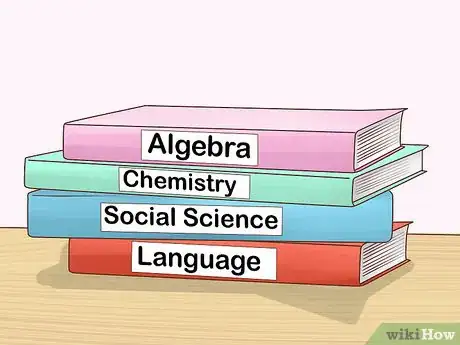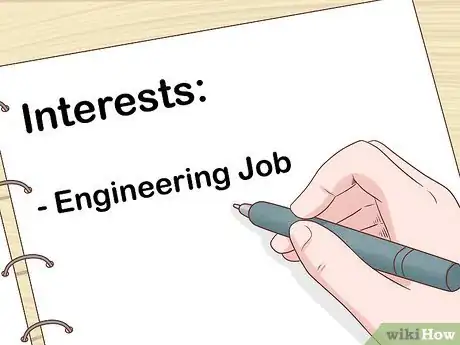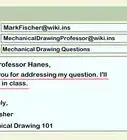This article was co-authored by Ted Coopersmith, MBA. Ted Coopersmith is an Academic Tutor for Manhattan Elite Prep, a test prep and academic tutoring company based in New York City. In addition to general academic advising, Ted has expertise in preparing for the ACT, SAT, SSAT, and ASVAB tests. He also has over 30 years of financial controller advising and consulting experience. He holds a BA from the City University of New York (CUNY) and an MBA from Pace University.
This article has been viewed 20,105 times.
You may have read the title of this article and thought “I’m in middle school, do I really need to be thinking about college right now?” College definitely shouldn't be your main concern in middle school. However, thinking about college and your future now, even as a middle schooler, is a great way to help you be fully prepared for what is to come within your academic career. This wikiHow will give you some valuable college prep information if you’re a middle schooler.
Steps
Laying the Academic Groundwork
-
1Work on developing good study habits if you don’t already have them. Since your middle school grades won’t count for college,[1] now is an excellent time to work on study habits to help you through high school. Discuss with your teachers and your parents what skills they feel you need to work on if you can’t pinpoint anything right away.[2]
- If you wait until midway through your junior year of high school to work on your study habits, keep in mind that your freshman and sophomore grades (as well as the first part of your junior year) could end up costing you admission to one of your dream schools.
-
2Consider high school level classes if they are offered at your middle school. Not only will this be a great time to get a feel for a high school course, but it’ll also be a great opportunity to get a good grade on your college transcript. If you’re willing to work hard, this can be the perfect way to start preparing for college.
- If you’re unsure what high school level classes (if any) are offered at your school, speak with your middle school counselor. They'll be able to help you decide if these classes are suitable for you, too.
Advertisement -
3Take a wide variety of courses. Even if you don’t feel ready to take high school courses, try your best to take a variety of courses. This way, you can get a feel for what route you want to and don’t want to go down in high school as far as classes go.[3] You may even get a future career idea!
-
4Join multiple extracurricular activities. Similar to grades, extracurricular activities you do in middle school won’t count for college. That is why it’s a great time to try quite a few. You'll get a feel for what you enjoy and don’t enjoy, and you can decide what you want to continue in high school.
- Don't bite off more than you can chew; trying, at the most, 4-5 extracurriculars you really enjoy will help make sure you aren’t spreading yourself too thin.[4]
-
5Try to build your vocabulary. This will be extremely helpful when it comes time to take your SAT in high school, so that you won’t struggle during the reading section when you see unfamiliar words, and so that you can use a wider range of vocabulary if you choose the essay (both strategies can boost your score). When you’re reading something, write down any unfamiliar words, and look them up either in a dictionary or on the internet. Write them down in a small notebook to create your very own dictionary.
-
6Consider applying for scholarships. Yes, there are a lot more scholarships for high schoolers. However, believe it or not, there are actually a few scholarships out there for middle schoolers, too.[5] This is the perfect time to begin securing free money for your future.
- Be sure that you read each of the eligibility requirements for the scholarships you apply for. Some may require you to be involved in a sport, be in a certain extracurricular, or something else. You definitely won’t win the scholarships you apply for if you aren’t eligible, and they’ll end up being a waste of your time.
Considering Your Possible Paths
-
1Talk to your parents and other family members about college. Discuss their experiences with college (if they went), and what they liked and disliked about their experiences.
-
2Volunteer. Similar to extracurriculars, colleges like to see that you’ve volunteered. Since volunteering is meant to be an ongoing commitment, and not just something you start your senior year, getting one or two volunteer experiences started in middle school can be very valuable.[6]
- Try to volunteer for an organization that aligns with a career you’re thinking about.
-
3Search for careers you may be interested in. Your parents and family members can help you with this, as can your middle school counselor. Try thinking about your interests, and any jobs that may go along with them. Write them down and keep them for future reference.
- You don't have to make any firm decisions on your career path now. It's very normal for plans to change as you age. However, it's never too early to investigate professions you might be interested in and seek out mentors who can tell you about those fields.
-
4Work on improving your general communication skills. Yes, communication may not be your strongest suit; however, developing your oral and written communication skills will be important for college and beyond. Laying the groundwork now will help you succeed at future oral presentations and essays.[7]
- Ask your family members or friends for help with this, so you can practice public speaking in front of them.
-
5Visit a colleges on any trips you take, if you can. Many colleges host events that are open to the entire community, so keep an eye out for these. This can help you go and get a good idea of what a college campus looks like. If you have a "dream school" in mind already, it doesn't hurt to take a look!
-
6Take proactive steps where you can, but don't stress about college. College prep shouldn't be an everyday activity at your stage. You've still got plenty of time ahead of you, before you need to think of actual admissions and applications. While it’s great you’re readying yourself and even applying for scholarships now, remember that you’re still a kid, so make time to be one. Hang out with your friends, and take time for yourself.
Community Q&A
-
QuestionWhat if you're not sure your career will make you successful as an adult?
 twigberryCommunity AnswerIt depends on what kind of career you want to pursue. Ask yourself, "Can I make money from this?" If you aren't sure, see if anyone else has pursued the career you've chosen. If you really feel you need to than it's always possible to change your career. But it's something you have to put a lot of thought into.
twigberryCommunity AnswerIt depends on what kind of career you want to pursue. Ask yourself, "Can I make money from this?" If you aren't sure, see if anyone else has pursued the career you've chosen. If you really feel you need to than it's always possible to change your career. But it's something you have to put a lot of thought into.
Warnings
- When it comes to extracurriculars and volunteering, remember quality over quantity. Don’t bog yourself down with things you really aren’t enjoying.⧼thumbs_response⧽
References
- ↑ https://www.thoughtco.com/college-preparation-in-middle-school-786936
- ↑ Ted Coopersmith, MBA. Academic Tutor. Expert Interview. 10 July 2020.
- ↑ Ted Coopersmith, MBA. Academic Tutor. Expert Interview. 10 July 2020.
- ↑ Ted Coopersmith, MBA. Academic Tutor. Expert Interview. 10 July 2020.
- ↑ https://jlvcollegecounseling.com/scholarships/age/middle-school/
- ↑ https://www.voa.org/what-types-of-volunteer-work-do-colleges-look-for
- ↑ https://blog.connectionsacademy.com/top-8-college-prep-tips-middle-school-high-school/
- ↑ https://www.greatschools.org/gk/articles/middle-school-parents-college-prep-guide/







































































